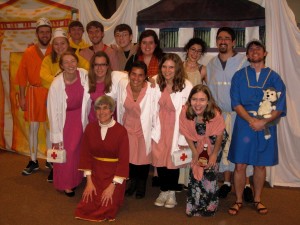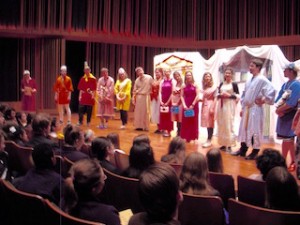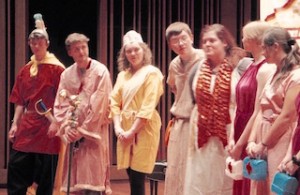St. Olaf Latin Play MMXVI
Click here to download a slideshow from the 2016 production of Plautus’ Curculio.

Wednesday, March 9, 2016
Seven Hills Preparatory Academy, Bloomington – 8:50 a.m.
St. Croix Preparatory Academy, Stillwater (+ students from Christ’s Household of Faith) – 10:45 a.m.
Benilde-St. Margaret’s School, St. Louis Park – 1:15 p.m.
Macalester College, St. Paul (+ students from Parnassus Preparatory School) – 5:00 p.m.
Thursday, March 10, 2016
John Marshall High School, Rochester (+ students from Century and Mayo High Schools) – 10:00 a.m.
Eagle Ridge Academy, Eden Prairie – 1:30 p.m.
Gustavus Adolphus College, St. Peter – 5:00 p.m.
Friday & Saturday, March 11-12, 2016
St. Olaf College, Christiansen Hall of Music 233 (Fosnes Hall) – 7:30 p.m.

Titus Maccius Plautus (c. 254-184 BCE) wrote over 100 comedies, of which 20 survive. All are Latin adaptations of earlier Greek comedies. Even though the characters speak in Latin, they are meant to be Greeks, not Romans: they wear Greek clothing and have Greek names.
Plautus’ source for the Curculio is unknown. The play takes place in Epidaurus, Greece, at the sanctuary of Asclepius, the god of medicine. People suffering from illness used to travel to Epidaurus and spend the night “incubating” in the god’s temple, hoping that Asclepius or one of his sacred snakes would appear to them in a dream and cure them.

Curculio is the Latin word for “weevil,” a beetle whose larva eats many times its weight in grain. It is also the name of a major character in the play: the parasite. Like a weevil, Curculio loves food and is willing to do anything to earn a meal.
Plautus composed his plays entirely in verse, with some sections designed to be sung. We have set these and other sections to music; the tunes roughly reflect the meters of the original Latin. In Plautus’ day musical accompaniment would have been provided by an instrument called an aulos, similar to an oboe. All of the actors were male and probably wore masks.
While we have generally remained faithful to Plautus’ text, we have taken the liberty of adding a prologue, doubling the number of cooks, and including a chorus of nurses who work for Cappadox. Their song comes at a point in the play where Plautus, breaking the dramatic illusion, has the stage manager chat with the audience members who are sitting in the Roman Forum.
Plautus’ Curculio would originally have been performed without intermission, as we too will perform it.
CAST OF CHARACTERS (in order of appearance)
(* = part includes a song)
Aesculapius, god of medicine: Anne H. Groton (piano)
Phaedromus, young man in love: Leif D. McLellan ’16
Palinurus, Phaedromus’ slave: Ryan M. Mathison ‘16
Leaena, Cappadox’s doorkeeper*: Sophie D. Rossiter ’19
Planesium, one of Cappadox’s slave-girls, loved by Phaedromus: Vivian C. Williams ’16
Prophetic chefs: Devin P. Ames ’19, Marissa N. Ihrke ‘19
Cappadox, slave-dealer*: Kirby Schoephoerster ’17
Singing nurses*: Eleanor D. Anderson ’16, Mary Landis Gaston ’19, Martha E. Melin ’16, Karice E. Myers-Busch ’17 (oboe)
Curculio, parasite*: Allison R. Lonigro ’16 (flute)
Lyco, banker*: Nathan M. Swan ’19
Therapontigonus, soldier*: Joseph A. C. Burkhart ’17
PLOT SUMMARY
Scene 1: After a prologue by Asclepius, the ancient god of medicine, Phaedromus and his smart-aleck slave Palinurus appear. Palinurus wonders why his master is awake before dawn. Phaedromus reveals that he is in love with Planesium, a beautiful slave-girl living in the house of Cappadox the slave-dealer. Because he has no money with which to buy her freedom, Phaedromus has sent Curculio to Turkey (Asia Minor) to borrow money from one of Phaedromus’ friends. Although Cappadox will not allow the young man to visit Planesium until he can afford to buy her, Phaedromus can’t wait: he has brought along a drink (wine in Plautus’ version) with which to bribe the old woman, Leaena, who guards Cappadox’s door.
Scenes 2-3: Leaena sings about her love for the divine beverage; the sound of her voice prompts Planesium, from behind the locked door, to join in and sing about her love for Phaedromus (Song #1). After Leaena has unlocked the door, the two lovers have a touching encounter. Then Planesium hurries back into Cappadox’s house, and two prophetic chefs appear; they are to cook lunch for the parasite, who is due to return that very day.
Scenes 4-6: Cappadox and his four nurses leave the temple of Asclepius, where the slave-dealer has spent the night (Song #2). Palinurus and the chefs volunteer to interpret a bad dream that Cappadox has had; after much confusion Cappadox goes back into the temple to make peace with the god. Suddenly Curculio arrives. The hungry parasite announces that he was not able to get any money but did steal the signet ring (we have substituted a modern equivalent) of a soldier, Therapontigonus Platagidorus, who was intending to buy Planesium for himself and had left money with a banker in Epidaurus. Curculio plans to forge a letter, pretend to be the soldier’s messenger, and convince the slave-dealer to hand Planesium over to him, not to the soldier. He and the others go inside the house to make preparations.
Scenes 7-9: Lyco the banker arrives and complains about being broke (Song #3). Curculio comes on stage wearing a strange disguise; Lyco is suspicious but eventually agrees to give the soldier’s money to Cappadox, who just then exits from the temple; as he, Lyco, and Curculio go into his house to finalize the deal, the nurses sing about their occupational woes (Song #4). Curculio, Cappadox, and Lyco emerge with Planesium. Warning the slave-dealer that he will have to return the money if the girl is ever found to be free-born, Curculio leads her away—supposedly to the soldier but actually to Phaedromus’ house. Cappadox goes back into the temple to thank the god for a profitable day.
Scenes 10-14: Therapontigonus enters, runs into the banker, and demands his money so that he can buy Planesium. Lyco insists that the deal is already done. Cappadox again exits from the temple; Therapontigonus learns from him what has happened and rightly assumes that the culprit is Curculio. At that moment Curculio, Phaedromus, and Planesium show up; after an animated conversation, the soldier discovers that Planesium is his long-lost sister (Song #5). He betroths her to Phaedromus. Cappadox is forced to pay back the money he received for the free-born girl, and the play ends on a happy note.

You must be logged in to post a comment.